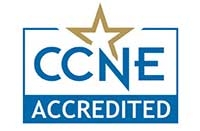Admission and Course Information
Here we provide information on admission and course requirements, course descriptions and the handbook for MSN Graduate Students for you to review.

Our Master of Science in Nursing (MSN) Degree allows for 3 concentration options.
Students may choose the adult/gerontology acute care clinical nurse specialist (CNS) area of study or the adult/gerontology acute care nurse practitioner (NP) area of study. Students who successfully complete this program will be eligible to apply to take the following certification examinations: the American Nurses Credentialing Center Adult Acute exam, the American Association of Critical Care Nurses, Adult-Gerontology Acute Care NP exam, the American Nurses Credentialing Center Adult/Gerontology CNS exam, the American Association of Critical Care Nurses Adult/Gerontology Acute CNS exam.
Students who successfully complete the population/public health area of study will be eligible to practice in leadership roles in the community and as nurse educators who instruct community/public health nursing in academic settings.

The baccalaureate degree program in nursing, master’s degree program in nursing, and Doctor of Nursing Practice program at Rhode Island College are accredited by the Commission on Collegiate Nursing Education (http://www.ccneaccreditation.org).
Your application can be submitted online. To begin the process you will need to sign up for an account with CollegeNET. Once you have a CollegeNET account, you will be able to log in any time and see your Activity Log which shows you a personalized status page.
Here we provide information on admission and course requirements, course descriptions and the handbook for MSN Graduate Students for you to review.
Every year students must provide health services with evidence of a negative PPD test or compliance with treatment. Before beginning some clinical nursing courses, students may be expected to meet additional health requirements.
All nursing students must have the following information on file in College Health Services:
*Health-care workers born on or before Dec. 31, 1956, are only required to have documentation of one dose each of measles, mumps and rubella or titers confirming immunity.
**2-Step PPD – two separate PPDs planted at least a week apart but not more than a year apart prior to entering into nursing clinical.
View Printable Version of Health and Immunization Checklist
Please Note: Students will not be admitted to the first class meeting of a nursing practicum course without having complied with the health requirements. Proof of immunization may be obtained from your physician, high school, previous college or university, military record, and/or from blood titers.
Please Note: Nursing majors should follow the guidelines on the college immunization form or call College Health Services at 401-456-8055 for further information. Once all required information is complete, students may pick up their laminated identification cards at College Health Services.
Students of the MSN Program will demonstrate mastery of all of the Essentials of Master’s Education in Nursing (AACN, 2011) and the AACN (2021) Competencies and level-2 Sub-competencies within the Ten Domains for Nursing, leading to achievement of the following MSN End-of-Program Outcomes:

